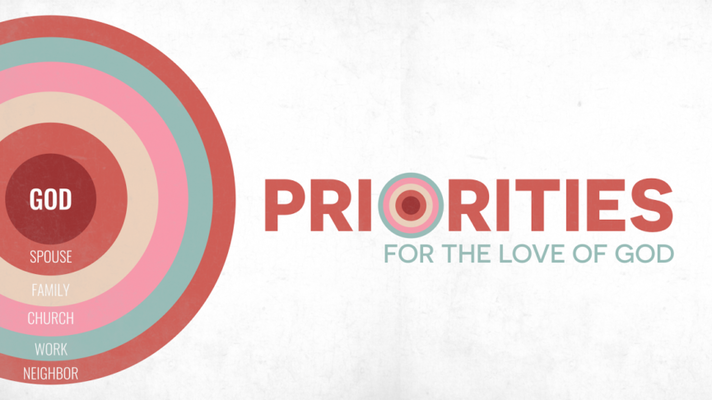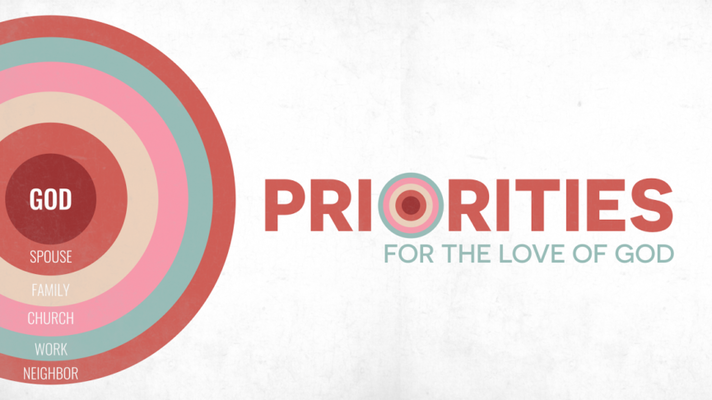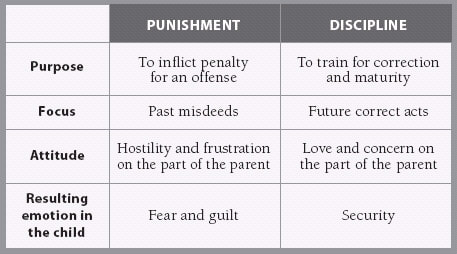 Prince Charming and Snow White may have looked like they had a perfect marriage ahead of them, but let's be real. The next day Snow found that the toothpaste tube had been squeezed wrong and the toilet seat had been left up. Prince found nylon stockings hanging on his towel and...well, let's just say that the Dwarf's had exaggerated Snow's ability to cook. Does this put "happily ever after" in jeopardy? Not at all. All couples have problems. Many couples have LOTS of problems. But they can still have a wonderful life together if they commit to dealing with their problems God's way. Some of the best marriage advice comes from Paul's admonition to not let the sun go down on your anger. Husbands and wives will find that their joy increases when they commit to resolving their problems and not carrying them to bed each night. Imagine the scenario again: Prince finds the stockings dangling over his towel yet again! He's irked by how inconsiderate his wife is. But instead of calmly talking to her about it, he huffs off to put his PJ's on. He throws a pillow over his head and makes his best attempt to sleep on it. In the morning he "hi-ho's" off to work, being happy to be away. What Prince has done is allow the sin of resentment to build a small, invisible wall between himself and the new Mrs. Charming. Each night this happens, more bricks are added to the wall and more damage is done to the relationship. [Let's remember Mrs. Charming could be reacting to his resentment in a not-so-good manner too. She may get huffy with his grumpy attitude and becoming embittered herself! Needless to say, happily ever after could be in serious danger as the relationship spirals further downward!] Is the marriage doomed? Are the Dwarfs going to have to have Snow move back in with them? Not if the couple begins to look to the Lord's way. Remember that no wall ever has to be built in the first place. Instead of internalizing his anger and letting the sun go down on it, Prince can focus that anger on the problem at hand. He can go to his wife and tenderly speak with her about his annoyance. Perhaps he can even build a special rack for her stockings, so she can hang them in the laundry room. Even if a wall has been built up over many years and multiple layers of angst exist, the marriage can be restored. Scripture says, "Repent therefore, that times of refreshing may come." God is able to bring times of refreshing to the marriage and restore happily ever after. God's refreshing grace will only come through repentance though, and each of the bricks that have been laid has to be removed. Key to this demolition process is personal responsibility. That is to say, each person take care of his own bricks first. Prince may want the "inconsiderate stocking bricks" to be removed, but he must first deal with his own contributions to the wall. Prince needs to humble himself and acknowledge that his lack of godly communication has contributed significantly to the family's troubles. Thus, the first step to happily ever after would be to do something like this: "Snow, Things have been difficult as of late, and I recognize a lot of it is my fault. I haven't been open with you or forthright about things on my mind. I want to to ask your forgiveness for that. I think our relationship would be better if I were better at communicating. Being that I have a hard time expressing my feelings, can you be in prayer for me? I really need God's help in this regard." It may be good to leave it at that for the time being. That's because it's not about them at this moment. It is about you and your sin. Maybe the next day, you can come back with, "I am going to try the communication thing. This is hard for me, you'll recognize. But one of the things I have trouble with is..." Just like that two bricks have just been removed. The wall is beginning to crumble and the lovely couple is back on track to experiencing their happily ever after. Need More Counsel?
Do you have issues with which you are struggling? Marriage, family, or otherwise? God's word has the answers to all of life's problems. No matter what difficulties you are facing, the leadership at Hopewell can help you find peace and joy.
0 Comments
 Dave and Jane were on their way to their first premarital counseling appointment. As a newly engaged couple they were excited to meet with the minister, but they were also pretty nervous. To break the tension Dave asked, "What are you hoping to get out of these meetings?" This led to a fruitful discussion. They agreed that they wanted help with communication. Dave knew he needed to learn how to communicate (as many men do). Jane wanted to be able to communicate less mysteriously ("So I can understand what you mean," as Dave put it). They were also beginning to think about the issue of money too. They both agreed that having some wisdom on saving, spending, and perhaps even combining their wages. Neither openly admitted it, but each secretly hoped that they might pick up some good tips on helping sex to go well too. ________________________________________________________________ Look to the LORD and his strength; seek his face always. Psalm 105:4 _____________________________________________________________ Needless to say, they were a bit disappointed when the minister said they ought to begin their premarital counseling by talking about God. As Christopher Ash points out in his book Married for God: Making your marriage the best that it can be, the Bible begins with God and is all about God. And he goes on to state that every marriage be similar. Every marriage must grow out of and be planted in the Lordship of Jesus Christ. It should begin with and be all about the Lord and His interests all throughout. Ash points out that many marriages start off on the wrong foot because they don't have this orientation. Most marriages are self focused. Most books on marriage do not help in this regard. The best seller, Men are from Mars, Women are from Venus has as its subtitle, "A Practical Guide to Getting What You Want in Your Relationship." Do you see the error? It's about getting what YOU want out of YOUR relationship. It would seem that Mars and Venus orbit around ME and not the sun. Even many Christian books and seminars make the same mistake. They sell themselves as practical guides on how to achieve a "happier" or "more fulfilling" relationship. And sell they do! There is a lot money to be had in the self help, self focused, self gratification marriage line. It's not that having a happy and fulfilling relationship is bad, or even impossible to achieve. Marriage is a wonderful institution, created for our enjoyment and mutual gratification. It's just that this personal happiness and fulfillment isn't to be our primary focus. It's not to be about me and my happiness. Marriage is to serve God. It is to be about Him, His purposes, His will, His kingdom, and His desires. Married couples (and those who will be married) should be asking, "What does God want me to be and do here?" In sum, marriage is far from being about ourselves. It is about denying ourselves. It is a commitment to seeking His pleasure over and against our own. This is the issues that puts the single person at ease. Singleness is okay, because I'm living for Christ. This is the answer to those who wonder if their relationship is going to last. Why? Because it is not centered on my own interests. It is centered in who God is to me and what He desires from me. Those who are courting and asking, "Is this the one? Will I be happy with this person?" may find that their questions are not altogether necessary when they take this perspective. It is not about you. It's about pleasing the Lord and seeking our satisfaction in what satisfies the Lord. Today it is common for people to live together and have sexual relations before they get married. The thought is that they need to "test it out" to see if there will be compatibility. It's not surprising that 90% of these relationships don't last. This common American practice is nothing other than a blind search for fulfillment and happiness in myself and for myself. It is driven by a consumer's perspective: it's is all about ME. Psalm 105 states the rule by which Christians live : Look to the Lord...seek his face always. Paul says, "Whether at home or away, we make it our aim to please Him." 2 Cor. 5:9 Neither of these passages are about marriage, per se, but they provide the proper structure for marriage. It is the best counsel one can receive as one gets ready for or lives in their marriage.  I once bought the extra cheap knock off brand of paper towels from the extra-cheap grocery store chain. One spill proved that was a mistake. It may have looked the same as the name brand, but it was a far cry from being the real deal. Scripture tells us that when we awaken in glory there will be a similar sensation. The highest pleasures of this world will feel like cheap knock offs in comparison to the true heavenly realities that will greet us in that coming land. When we open our eyes, not only will the bitterness of death be gone, but a radical, new thrill will beam through our souls. The sensations will be familiar, but their quality will be intensified and magnified a thousand times over. ________________________________________ For now we see through a glass, darkly... now I know in part; but then shall I know even as also I am known. 1 Corinthians 13:12 ________________________________________ That's what Paul is communicating in the above mentioned verse. In 1 Corinthians 13 Paul was talking about love and the eternal world. He says we 'know' what the future world will hold, but 'only in part.' We've experienced some of those blessings in this life, but it was only a corrupted fraction of the true and full realities that will meet us in glory. This is what seeing through a glass darkly means. The mirrors of the ancient world did not render the pristine reflections that we have today. At best, the mirror was a piece of polished brass. It would be like seeing if you were having a good hair day by looking at your reflection in the hood of your car. Take a gander at the following list. You've enjoyed the blessing of each, right?
The truth is you haven't even begun to experience these things. Your experience was a darkened, mutated expression of the heavenly reality. The happiest moment on this planet will be like utter sadness in heaven. The best fellowship that you've ever had is just a paltry fraction of the depth of true communion you will have there. You will find your previous friendships to only hatred by comparison. We've seen the stars at night. They are beautiful to behold. But each of those stars is so distant. There is a sense in which we do not have a full comprehension of that star's true nature. Each of those celestial lights is comparable to (if not greater than) our Sun. Imagine the overwhelming experience of having looked at one of those stars, then, in a blink, you were face to face with it, as if sitting on the surface of Mercury gazing at the sun. This is what it will be like when we pass through the river of death. You will come face to face with peace. Yes, you will know what it is. You've witnessed it from afar. But it was the cheap imitation that will not compare to the heavenly endowment. The peace that will fall upon you there will be of an exceedingly heightened nature. Not only will it be completely undefiled, but its eternal character will make all previous experiences of peace seem like the raging storms of hell. In that moment of moments, as death's portal gives way, you will be enraptured with the "eternal weight of glory." You will know in the fullest sense of knowing the wonder of heaven. The Autobiography of John G. Paton"When I am parched and dry in my own soul the best cure that I know is to pick up and read a good Christian biography." -Unknown
John G. Paton dared to face the cannibals of New Hebrides in order to bring the gospel to this heathen people. This free ebook not only recounts Paton's preparation for and adventures in that faithful mission, but will serve to be a devotional read for young and old alike.  Traveling I-376 into the city of Pittsburg gives you a glimpse into the radical experience that we Christians will have immediately upon death. Those coming into the city's West End must pass through the famous Fort Pitt Tunnel which burrows straight through the towering Mt. Washington. As you follow the flow of traffic into the tunnel darkness slowly begins to encase you. The light of day fades as you descend deeper into the cavern. About a mile out in front of you sits a small sheet of white light which is the mouth of the tunnel. The closer you get, the larger and more brilliantly bright it appears to get. Once you reach it the darkness is immediately rolled back. There before you stands the city's dazzling skyline. The skyscrapers welcome you as the sun's radiant luster pierces your eyes. To be sure, the city of Pittsburg cannot compare to the infinite wonders of heaven. But the parallel certainly is there. Our eyes will one day darken. This life will fade into oblivion. We will breathe our last. But that will not be the end. Immediately, a whole new world will greet us. A whole new existence will take possession of us. In that next moment we will instantaneously be stunned by a radically new life, the sensation of which being wholly unimaginable. On the cross, Jesus lifted the thoughts of the poor wretch dying beside him to that world. Christ consoled his penitence and his earthly suffering with the promise of immortal bliss in the heavenly dimension. That very day he would be with Jesus in Paradise. Because he had trusted in Christ he was given the full assurance that, though his present existence would end, he would not die. He would be translated into that higher more glorious realm and partake of its infinite riches. Over the course of the next several weeks, we will try, as best we can, to contemplate that world. Better yet, we'll try to grasp that moment--that moment of moments--that radical, life changing moment which will overwhelm us immediately after our demise. We will ask ourselves: What will it be like? What will we experience when our eyes open on the other side? Though we will only be able to see through a glass darkly, we will attempt to gain insight into this supernal joy that will be revealed. Here we simply note it's reality. The promise to every true believer is that upon death he will immediately precede into the fuller experience of his eternal life. Jesus affirms to everyone who dies in Him: "Today you will be with me in Paradise." Mark those words "fuller experience of your eternal life." Those who trust in Christ do not wait for eternal life. We wait for the fuller realization of it. We know that at death this life will give way to something much more grandiose. But anyone who is in Christ possess eternal life now. Though we do not have the full experience of it, we do have full possession of it. Jesus said of his followers, "I give them eternal life, and they shall never perish." John 10:28 This reality is ours. It is currently ours. And the fuller experience, which is to come, is ours to savor now. You may even say this: Scripture has not just given us a future hope, but it teases us with it. It gives us little clues and bits of information here and there. The whole of it has not made known, but enough has revealed to whet our appetites and make us crave it. And over the next few weeks we'll meditate on these clues and begin to let our minds be drawn upward. We invite you along in this study. We invite you to learn about the vast riches to be revealed. It is our hope that your soul will dabble in the wonders that await us. As we deal with this world's woes, we hope your burdens will be made light by the surpassing glory which is to come. Learn More about the Afterlife
You can learn more about the future life through our End Times Study ebook. This free download gives you a Scripture based overview of doctrines such as death, life after death, the second coming of Christ, the millenium, and the resurrection.  I take that back, I have one last thought on parenting...or any kind of life with God for that matter. It is this: You are going to be terrible at it,and that's not altogether a bad thing. This lesson is so important. It reminds us that God is God and we are not. Obviously, we are to strive to do our best and serve the Lord with faithfulness. We know we must be as diligent as possible. But let's take a moment and glory in the fact that...
_______________________________________ Folly is bound up in the heart of A PARENT, but GOD IS GRACIOUS nevertheless. ________________________________________ Too often I have heard parents lament the fact that they 1) have not done enough and 2) they have not done it right. But let's throw up our hands together and praise God that He alone is Sovereign and can work above and beyond anything we do, don't do, or do completely wrong.
Let's admit that "folly is bound up in our own hearts" just as much as it is bound up in our child's. We can be honest and admit (and even glory in) the fact that we are inept vessels in the hands of a great God. The Apostle Paul had kids (spiritual ones) and he expressed the same sentiment. He confessed his weakness openly and reveled in the fact that God's "grace was sufficient" and that His "power is made perfect in weakness." Take this to heart when your children fail too. You may pour yourself into them and hone every single possible parenting principle down to the tee. Despite your best efforts, they will still fight, hold secrets from you, make their own decisions, etc. God is good that way. These are God's ways of telling us that it isn't about us. It is His way of humbling us and highlighting our utter dependence upon His supreme authority. Think about it this way: God was pleased to commit the church into the hands of a bunch of fishermen (I always like to remind people that they were more like fisherboys, because they were likely in their teens and early 20's when Pentecost rolled around). When it came to the ministry, even the Apostle Paul confessed, "Who is sufficient for these things?" That continues to be the motto of every elder and minister who takes leadership in the church today. God's own Son even embodied that principle. He had no beauty that we should behold Him. He had no majesty that should attract us to Him. His birth was ignoble. His heritage and ministry was humble. Most of all, he was defeated! He was crucified in weakness. God delights to use the weak things of the world. The foolishness of men is His instrument of victory. It doesn't matter if it is patriarchs, pastors, or parents. God loves using bumbling sinners. His chosen tools are those who are severely limited by their ignorance, sin, and ineptitude. So as you face the frustrations - be it in yourself or in your children - take a moment to revel in it, rather than lament it. God is God, and we are not. God has brought you to the very edge of parenting that you may view in all its splendor the grace, grandeur, and greatness of God.  There's much to be said about applying the rod of discipline. Unfortunately, this series of articles will not touch on many of the beneficial topics in this realm of parenting, such as certain cautions, consistency, and particular "how to's" of discipline. We simply wish to end this series by saying that discipline is just that: discipline. It is not punishment, per se. Admittedly, we use those words interchangeably, but there is a technical difference. Punishment has primarily a negative connotation. It has to do with payback and judgment. The Hebrew word "pakad" (to punish) denotes suffering that is issued forth out of anger and comes upon those who are God's hated enemies. Discipline is much more positive in its force. Well, of course, the paddle may have a 'negative force,' but the idea of discipline is that of discipleship. As a matter of fact, the Hebrew word in the above proverb (musar) can also mean "correction" or "instruction." It may very well be called the 'rod of correction' or 'rod of instruction.' Maybe this is why my parents would often call it 'the board of education'? The rod, we should understand, is for the purpose of training and looks towards future maturity. It's applied with the hope for improvement and comes forth as a merciful gesture, one which wishes to prevent greater pain/evil down the road. Punishment, by contrast is vindictive. Punishment could care less about you or your future welfare. It is simply raw justice. Discipline, on the other hand, may involve punitive measures, but it is not meant to drive one away or create alienation. It's ultimate purpose is much more relational. The person's foolishness is driven away, but not the person himself. In a word, punishment has to do with retribution and fear while discipline has to do with redemption and grace. In the gospel, Jesus was punished for our sins. This is why we need not fear God's condemnation. Now that we are God's children, we enjoy the loving discipline (correction) of our heavenly Father. We even welcome it as it does have our best interest in mind. Our children might not go that far. They may not welcome the rod, but at least we can view it in its proper light. It is merely an extension of our discipleship ministry among our children. Understanding the rod in this way will bear practical fruit for parenting. If we truly grasp it, a lot of the "how to" and "when to" questions will be largely answered. Most of all, we will see corporal discipline as a fruitful thing. It will not just be that which we inflict upon our children, it will a tool for helping us develop our children. And, to be sure, it can help develop our relationship with our children. Learn More about Biblical Parenting We at Hopewell want you to be thoroughly equipped to serve the Lord. If you want to learn more about Biblical parenting, let us know. We'd be happy to arrange a study or provide you with solid materials so you can learn on your own. This article is part of a larger series on Biblical Parenting which appeared in the Hopewell Weekly. Subscribe to our email list to get future articles delivered to your inbox.
We've acknowledged previously that the rod is one of the means God has instituted for correction, self-discipline, and growth in knowledge. The Scripture tells us that it is the tool that the Lord uses to "drive foolishness far from" our children. To that end we should apply it with good prudence when our children act out. The Scripture above is clear on how effective it is. As a matter of fact, the early American proverb is verification of how much educators believed in it: "Reading, writing, and arithmetic, all taught to the tune of a hickory stick." But it must be kept in mind that corporal punishment is not a vindictive action or even purely punitive in its function. It is an act of love. _______________________________________ Folly is bound up in the heart of a child, but the rod of discipline drives it far from him. Proverbs 22:15 ESV ________________________________________ To that end, spanking a child reflects God's discipline of us. This Scripture must be heard as an echo of the passage that preceded it. Proverbs 3:11 tells us that the "Lord disciplines those whom He loves." We are exhorted not to despise God's chastisement because it is a sign of His deepest interest in us. This is part of the reason the world around us seeks so avidly to dissuade us from the use of the rod. They despise it because there is no belief in God, or at least no belief in a God who induces any kind of personal suffering. The god of most Americans is only supposed to relieve suffering. Certainly a 'loving God' would not inflict suffering, would he? That's at least the opinion of our culture. But true Christians understand that the Lord brings us into obedience through suffering. We know that even Jesus himself, though sinless, "learned obedience through suffering." (Heb. 5:7). To this end, Christians have an alternative view of human pain and sorrow. Our momentary afflictions are being used by God to develop everlasting virtue. Our heavenly Father lovingly uses Providence as a way to develop our faith and life. When we spank our children, we understand that the rod's momentary affliction is reflective of God's own principle of love. Far from being an outgrowth of our anger, it is an indication of how much we care and have the child's best interests in mind. Come & Worship!
Are you looking for a church home? Do you want to learn more about who God is and what He is like? We at Hopewell would love to have you and your family join ours!  We will talk about the role of the rod, but not yet. There's something more fundamental that must be kept in mind. To be sure, corporal discipline is a God ordained means of building character, self-discipline, and wisdom. But it must be understood that it is merely ONE of the means God has appointed. It is a powerful tool, but it is a tool that is secondary. It must be accompanied by liberal use of God's main tool: His Word. _______________________________________ Folly is bound up in the heart of a child, but the rod of discipline drives it far from him. Proverbs 22:15 ESV ________________________________________ Note the language Solomon uses. He calls it, not just the rod, but the 'rod of discipline' (or chastisement, correction). The Hebrew word for 'discipline' carries with it the idea of 'instruction,' just as our word 'discipline' connotes the idea of 'discipleship.' Solomon's wisdom reminds us that the rod is a teacher, but it must be wielded in the hands of one who acts as a teacher. A good spank will communicate, but clear communication must accompany and support what that rod says. Ultimately, it comes down to one's goal. The foolishness of a child is not pent up in his or her rear. It is bound up in the heart. A child may learn discipline by the rod. But the rod alone will not touch the deepest regions of his/her soul where folly truly resides. On the other hand, "The word of God is living and active, sharper than any two-edged sword, piercing to the division of soul and of spirit, of joints and of marrow, and discerning the thoughts and intentions of the heart." Hebrews 4:12 To be sure, the rod by itself can be a means of provoking your child to wrath and driving them further into foolishness. For this reason, it must be kept in mind that the rod assumes the use of good communication, regular instruction, and godly exhortation. This, of course, begins with family worship: The Bible must be opened, read, and applied in the home. Children should also be made to sit through worship as much as they can so that they can hear God's word declared from the pulpit, sung in music, and administered through the sacraments. Immersion in the Scriptures might not be as dramatic as a paddle, but it is much more dynamic and the power thereof should not be underestimated. Moreover, when the rod is employed, it should typically be accompanied with instruction and affirmation. Parents should speak to their children about their need of discipline and the reason for it. After physical discipline takes place, children should be given expressions of affection to affirm your love, exhorted in how their behavior should change, directed in repentance/forgiveness, and encouraged through prayer. In his book "Shepherding a Child's Heart" Ted Trip tells the story of little Charlie, who had been caught stealing money from the church's offering plate. The child was confronted and made to return the money to the pastor. He produced $2 and proceeded to apologize, tears streaming down his face. The pastor commended the boy and began to explain that this is exactly why Christ came; that God sent his Son to die for people like us who were willing to steal from God and his people. Jesus life and death was for the purpose of making people givers and not takers. At this Charlie broke into more sobs and drew out another $20 from his pocket. He had prepared to go through the motions and keep back the hefty sum, but the gospel wouldn't let him do that. It reached into the depths of his soul and produced a change of paramount proportions. In Need of Counsel?
The Word of God has answers to all our problems. If you or someone you know is dealing with a life dominating issue - such as anxiety, anger, depression, or relational conflict, there's hope. Contact our leadership today and begin the road to restoration & relief.  I begin this article without having picked a picture above. I browsed the database of "parenting" and "family" pictures. Most of them have a sunny glow as the silhouetted mother and father skip along hand in hand with their adoring children. An aura of peaceful joy pervades as they gaze lovingly into one another's eyes. But that just seems a little too perfect for an article on parenting. Let's face it: Parenting is difficult. Sure, there is love and laughter. There are moments that will be etched upon the heart as golden memories. But there are also a lot of tears, heartbreak, and tough decisions that have to be made along the way. Why is that? It is because children arrive pre-programed. The factory setting, so to speak, is folly. This is where Christian parenting begins: knowing the child's true nature and understanding the state of their hearts. Scripture tells us that man is conceived and born in sin (Ps. 51:5). Children are sinners by nature because they have inherited Adam's corruption (Rom. 5:19). As a result, they sin and have a propensity towards all kinds of foolish behavior. This is what sets Christian parenting apart from most of the world. The prevailing belief is that man is "basically good." This leads to a certain style of parenting (or lack thereof!). They may call it "permissive" parenting or give it more fancy lingo (such as "montessori"). But the idea is that kids don't need a lot of discipline, teaching, or expressed parental intervention. In the worlds eyes, parents are merely providers of basic necessities - clothes, food, shelter, toys. At best, they provide an environment for the child's success. On the other hand, there are those, like Rousseau and Marx, who believe parents to be a serious detriment to a child's overall personal development! The Scriptural view is much different. Children have a serious innate problem. They are by foolish by nature. Selfishness, impatience, laziness, discontent, and conceit are riveted into the very fabric of who they are. Thus, they instinctively desire to lie, resist authority, cheat, quarrel, and pursue every other form of folly. This is why they need wise and godly parents. Parents are God's main tool for ministering to these inward defects. Through a parent's ministry a child comes face to face with God and His interests. The fundamental problems etched upon their souls are engaged and given right direction. To be sure, parents do not change the heart. This is God's domain of operation. This is why some children may follow in the steps of Esau. Nevertheless, mothers, fathers, grandfathers, & grandmothers are God's agents in dealing with the heart. Through you folly is addressed, correction is applied, and instruction is given. Through you God chooses to do His normal work of bringing about change. Through you the folly in their hearts can be dislodged and driven far from them. Subscribe the the Hopewell Weekly
This article is the first in a new series. Subscribe to the Hopewell Weekly to ensure you get the next installment.  Parenting can be tough. It can be even tougher when your children have become adults. But what do you do if your grown child leaves the church and lives a secular life? Sometimes covenant children do not continue in the faith once they leave the home. While we hope for the best, we know that many children don't end up continuing in the faith. Parents may feel as though there is nothing they can do. But this couldn't be farther from the truth. Parents forever remain the single most effective agent in their child's spiritual nurture. What's more, Scripture gives us guidelines to how to parent to the glory of God even after they have left the house. 1. Pray: Never underestimate the effectual working of parental prayer (James 5:16). Augustine, who is considered one of the church's greatest theologians, attributes his late-in-life conversion to the prayers of his mother, Monica. Since it is God who convinces and converts sinners, get on your knees. Pray for their hearts, pray that they meet other Christians, pray that they read and hear Scripture, pray that they may be kept from temptation, pray that they would be convicted repeatedly, pray that they may recollect the spiritual nurture they received in early life (John Newton was converted later in life by remembering Scripture verses which were drilled into him when he was 6 years old). 2. Evaluate yourself and get right with God: Our child's road to repentance may begin with our own. No parent is perfect, but sometimes parents can be guilty of "provoking their child to wrath." Some households have missed the boat on "bringing them up in the nurture and instruction of the Lord." (Eph. 6:4) If this is the case, there is no need to wallow in guilt. God's grace covers a multitude of sins. What's more, there is still great opportunities to parent in the adult years. But we need to be honest, confess where we failed, and make efforts to change. We don't want our ongoing parenting to continue to make the same mistakes. 3. Ask for forgiveness (if necessary): Show your child true brokenness for sin. If you were legalistic, overly harsh, or critical in their younger days, go to them. Admit you were wrong to do that and sincerely ask them for their forgiveness. This is what God wants, and it can go a long way to opening new, deeper lines of communication. 3. Testify about Christ: Christ is a part of your life. Talk him up. Not in a cheesy or forced way - they will see right through that. But at the same time, don't feel that you have to hold back. Your child may have rejected Christ, but you haven't. And you have every liberty to proclaim the goodness of the Lord. So be open about it. Talk about the things the Lord is doing in your life. Talk about the interesting people and programs at church. Let them know how helpful the church's leadership is. Offer the wisdom of Scripture where appropriate. You don't have to preach. All you need to do is be a witness. You can talk about how great Christ is, just as you'd chat up a good game or vacation. Each time you do, you set before your child a little gospel invitation. 4. Discuss their life's choices: You are still the parent. You still parent the child, no matter how old they are. And parents talk with their kids when they make bad choices. You may not nag or harp on them. You cannot command, scold, or rebuke them like you did when they were little. But you can have a mature, grown up conversation with them. As a matter of fact, your child expects you to discuss these things with them. That's because it's your job. 5. Let it go: "Once you’ve lovingly shared your opinion on the situation, there really is nothing else to say. Your child is an adult now and free to make his or her own decisions, even if you don’t agree."^ In sum, it's time to let the Holy Spirit take over. He is the one who brings conviction (Jn. 16:8). 6. Love them; enjoy them; bless them, praise them, have fun with them: In other words, keep that relationship alive and reflecting the fatherly kindness and lavish interest of God. The gospel is the good news of life and acceptance with God. Let your child know know something of this by the way you interact with them. To be sure, there is no magical wand or unique parenting trick that will ensure your child embraces Christ. But you can still use your covenantal position to point your child to God and His grace. LEARN MORE - Parenting Lost Children and Adult Children who Have Strayed from the faithAre you interested in learning more about how to parent a wayward child? Whether that child is in your home or grown, you can still be a great blessing to them and point them to a relationship with Christ.
Contact our pastoral staff to get counsel in this area.  "The fear of man lays a snare, but whoever trusts in the LORD is safe." Proverbs 29:25 What haunts you? What constantly lurks in your mind? What is it that frightens you into stopping dead in your tracks or pushes you into hiding? Ghouls and goblins are all the rage this time of year, but Hollywood's most spine-chilling horror scenes pale in comparison to the everyday opinions and approval of ordinary men. It's more terrifying than demons and more fiendish than devils. Criticism, rejection, the need for respect--these things can cripple us. We may not hide under the covers or shake uncontrollably in the fetal position , but we do become paralyzed in other ways. It can paralyze our speech or make us indecisive. The desire for approval can force us to hide behind certain patterns of behavior that are unbecoming or irrational. For instance...
Each of these examples is an example of someone who is ensnared. Their ego is enslaved to the approval of others. What's more, their lives are caught in a grinding mess of keeping this inflated image. But the cross of Christ brings redemption. When we crucify our ego and turn to Christ we find great freedom and safety. The gospel affords us a ton of relief; it provides us with the greatest form of security: God accepts us, sinners though we are. Our identity is not tied to what my neighbor thinks, but now it is tied up in my union with Christ. Here is my solace: God thinks of me as His child! I am at peace because my life is hidden with Christ in God. As our minds are cased upon God, we can be bold to live and speak as we ought. There is confidence and self assurance because we know that God's approval is the only thing of real worth. Man's approval is fleeting and vain. Those who are in Christ do not need to be constantly looking over their shoulder or worrying what is in the minds of others. They are freed from these hauntings because they are ever looking up to God, to please Him. The Truth will Set You FreeSelf examination can be scary, but this questionnaire may help set you free. These 14 questions can help you find out if you are trapped in the fear of man.
 Honor the Lord with your wealth and with the firstfruits of all your produce; then your barns will be filled with plenty, and your vats will be bursting with wine. Proverbs 3:9-10 Money is important to God. That's because the way you handle it shows your heart's affection for God. Scripture makes it clear that propriety in the purse is a priority. For instance,
To be sure, the sheer amount of teaching dedicated to this one topic can't be squeezed into this email. But take note of the following priorities for the purse: 1. Give to God and be as Generous as Possible: The OT tithe was the "first fruits" of the crop. The Israelites were to give to God first, recognizing that all was His, His kingdom was first, and their livelihood was dependent upon Him. (Mal. 3:8f; Lev. 27:30). It was their way of showing that God was first in their lives. In similar fashion the NT tells us to dedicate a portion of our earnings to the work of the ministry (2 Cor. 16:2). As we make our budget, we must likewise put the glory and honor of God first in our spending habits. 2. Live within your means: (i.e. be content) What do you do with the rest of your money? The answer is simple: don't squander it on wasteful living. You must be responsible to buy only what you can afford, demonstrate thrift, and limit your pleasures. If your income is slim, you may need to cut out restaurants and eat a lot of rice & peanut butter. Your car may have to be traded in for a bike. Whatever measures you take, you are seeking to say to God: "I love you more than the things of this world and I will be happy with what you give me." This is the glory of a monthly budget. It helps you watch where each penny goes and stay accountable to God. Need help with a budget? Check out the Every Dollar App too. 3. Thrift: It is interesting that after multiplying the few loaves of bread to feed a couple thousand people, the disciples picked up the leftovers. Even though the Son of God could make bread appear out of thin air, that was no excuse to be wasteful. God wants us to be cognizant about what we have and thrifty in how we use it, even if we have in abundance. Being a good steward means taking care of the all of the God given gifts in our possession, not wasting a single bit. 4. Save for the future: Proverbs 30:25 tells us about ants that gather and save for the winter. They have a forward thinking life and not a mind for the pleasures of the present. That little bug is a sermon on how God wants us to be laying up what we can for the future. We shouldn't leave retirement to "faith" or blindly believe that "God will take care of me." True faith will plan now and take the proper steps to guarantee some stability for the coming "winter." 5. Ditch the Debt: Scripture tells us that the debtor is slave to the lender (Proverbs 22:7). Your life is essentially owned by those who hold the rights to your wallet. More than that, debt sucks away your income by means of interest payments. It is usually not financially wise to pull out a car loan, rack up credit cards, or become encumbered with student loans. You pay more in the long run. The biblical method is to save now, buy later: Hope deferred makes the heart sick, but a longing fulfilled is a tree of life. (Proverbs 13:12) This article first appeared in the Hopewell Weekly. Subscribe to get updates, teachings, and announcements delivered to your inbox.  What is at the top of your prayer list? What issue consumes your prayer life? When you bow your head, what is it that you seek with the most fervor and zeal? Is it God's glory?
It may be argued that the Lord's prayer has a rank and file to it. The first three petitions focus on the Lord directly. The second three focus on our personal interests:
The first of the first petitions has to do with God's honor. It is, you may say, the "first and greatest commandment" of prayer, ranking before our daily bread and even our salvation. To hallow is to regard as holy, sacred, and with great admiration. Negatively speaking, we may say that it forbids any flippant attitude towards the things of God, emptiness of heart for God, or irreligious use of those items which pertain to God. What if we began to re-prioritize our prayers along these lines? What if, instead of starting our prayers with our needs and earth bound concerns, we asked for a greater reverence for God in our lives:
Would not many of our problems be corrected if we sought and achieved this by prayer? To be sure, blasphemy increases problems. "I will prepare your grave, for you are vile," said the Lord (Nahum 1:4). We know that He does not hold him "guiltless who takes His name in vain." But we also know that God will "honor those who honor him." (1 Sam 2:30). Does this not make it all the more imperative to pray for God's name to be hallowed? It is not by chance that this statement stands at the head of the Lord's Prayer. The glory of God is to be the chief pursuit of our lives. Let this priority thus beget the priority of our prayer life: Hallowed be Thy name. Want to develop your marriage with godly goals? The following article provides you with some specialized areas of concentration that may be helpful for you as you seek to
1. Speak Only Positive and Good Things About Each Other! Words are very powerful and have meaning. Studies of couple who continued to speak positive and uplifting words to one another had meaningful marriages. If you want the other person to love and take care of you for a lifetime, invest in speaking good things about one another. Compare your relationship to a bank account. The more positive deposits you make, the more valuable your account. 2. Don’t Hold Grudges! There will be disagreements. Forgive easily and to work on issues. One of the marvelous things about relationships is that we are all different. A difference of opinion does not mean a couple is not compatible. It just means that we all have different opinions. We all have different ways to accomplish the same thing or there are times when the other person has a better idea. 3. Pray For One Another Every Day! Marriage is a sacred institution and involves a spiritual battle. There are forces of evil seeking to break it apart or cause friction within it. Therefore, we must dedicate ourselves to praying with and for our mates as much as possible. Set time apart each day to pray for your spouse's needs, protection, and advancement. Pray that the Lord would show you how to better serve your spouse and be useful for advancing their happiness. 4. Buy Things For One Another! One of the biggest complaints of marriage is when a person stops doing nice things as they did when they were dating. Just because we are now married does not mean for us to stop sending cards, small gifts, flowers, going out on a date, and taking a special time to tell each other you love each other. Things don’t have to be expensive, but it is the thought that counts. Remember to invest in your relationship! 5. Worship Together! Marriage is difficult enough without maintaining a commitment to worship (weekly and daily). There are too many distractions and influences that will hinder a relationship without God. Remember your wedding vows, “What God has joined together.” Being close to God allows a couple to seek wisdom and guidance in their relationship. It also provides a willingness to allow forgiveness to play an important part of your marriage. 6. Touch, Spend Special Time Alone! There is something special about touching! One thing is that is shows the importance of each other. Touch never solves disagreements, but it does give validation to the fact that you care for the other person. So be sure to give hugs, put your arm around your spouse, or give a simple yet loving touch on the shoulder. Affirm your spouse and spread your affection through small, daily contacts. 7. Don’t Let Arguments or Disagreements Get Out Of Hand Disagreements in every relationship will happen, even in the best of marriages. Either of you can call a “time out” to set a time to discuss disagreements or you may agree to disagree for that moment. Remember when disagreements arise, it is always best to try to limit your anger and communicate to each other in positive ways. Never name call or place negative put-downs to one another. Do not use humor to make the other person look stupid. Successful marriages have learned the importance of loving one another without using negative influences or trying to get one’s way. These will only destroy a relationship. Once you fully understand this as a couple, you are on your way to having a more successful and productive relationship. 8. Express Your Gratitude! Don't take your spouse for granted. Did she get the kids dressed? This was a monumental thing. Sure it has happened a thousand times, but it is no less significant each time. Make sure she knows that you appreciate it. Did your husband make any kind of headway on your "honey-do" list? Leave a little note of gratitude for him. Your spouse needs your affirmation and regular praise. In this "home church" we should regularly build one another up and fulfill the Lord's command to be thankful (Col. 3:15). ___________________________________ [The above article was adapted from pastoralcareinc.com]  Our God specifically addresses the problem of worry in Philippians 4. He gives practical guidance to help us enjoy the "peace of God which surpasses all understanding." In sum, the Lord lays forth 4 steps to gainning the victory over anxiety. We must... 1. Feel Right - Notice the accent on emotional control in Philpians 4. God tells us "do not be anxious." In other words, don't let yourself be dominated by the emotion of worry. Instead, we must "rejoice in the Lord" and "let your reasonableness (i.e. restraint of passion) be known." Paul promises that we will feel the "Peace of God which surpasses all understanding." But it is of note that God works that peace as we seek to put off ungodly feelings and put on godly feelings. 2. Pray Right - "In everything by prayer and supplication with thanksgiving let your requests be made known to God." Phil 4:6 Sinclar Ferguson once said that prayer is the guilitine of anxiety. When we put our cares in God's hands, we virtually cut the head off the beast of anxiety. When we pray, we should essentially say, "God, this is your problem, not mine. If I can serve you in it, let me be your vessel. Until then, I trust that you will do what is right." Joseph Scriven penned majestic words: O what peace we often forfeit; O what needless pain we bear! All because we do not carry everything to God in prayer. 3. Think Right - "Whatever is true, whatever is honorable, whatever is just, whatever is pure, whatever is lovely, whatever is commendable, if there is any excellence, if there is anything worthy of praise, think about these things." Phil. 4:8 "Thought Replacement." It sounds like something out of a George Orwell book. But that's the tactic Scripture tells us to imploy. The rationale is easy to undrestand: If your brain is crammed full of godly thoughts, there won't be room enough for worry. So replace worrisome thoughts with blessed thoughts. Lift your mind off yourself, the present circumstances, and what the future supoosedly will be. Begin to think theologically and fill your mind with godly thoughts. Spend your energy adoring God, meditating on His attributes, reflecting on God's law/your duty, praying for others. Get a good book and read it. 4. Do Right - "What you have learned and received and heard and seen in me--practice these things, and the God of peace will be with you." Phil. 4:9 A lot of our worries come from sin (financially strapped because I'm spending too much). A lot of our sin stems from our worries (slacking at my job because I'm fretting). If we straighten out our behavior, a lot of reprieve will be had. Biblically speaking: Work and worry are polar opposites. That's why diligence and obedience are two major steping stones to easing our anxieties. ______________________________________ If we get our feelings, prayers, thoughts, and behavior conforming to God's word, our anxieties will melt away. The peace of God will be ours! Work on Your Worry!Is worry a thing for you?
Try applying some of these principles by using this worry worsheet. You'll find that its a meaningful resource for gaining greater peace in your life.  Fear, worry, and anxiety are just feelings - just like anger, guilt, and annoyance. They are, to be sure, a natural part of our humanity. But they are just emotions, and they don't have to govern us and become sin. God created us as emotive beings. Our emotions are part of who we are. Each of our feelings is part of our divine design and has its place. But, due to the fall, we must keep them in their place. To be sure, our problems are not our emotions. Our problem is letting ourselves be ruled by our emotions. When we allow our feelings to dominate us and dicatate our behavior (and not the Word of God), that is sin. Being annoyed with the faucet dripping is not necessarily wrong. That initial annoyance may be said to be a natural feeling. Bashing the sink in with a sledge hammer or yelling at your husband for not fixing it would be sinful. You've just let your emotion drive and control you. The same applies to fear and worry. Fear of your child being abducted is not necessarily a bad thing. Hovering over them every minute of their lives and not allowing them to take risks or carry out normal life activities is sinful. That fear has come to dominate your behavior. Parenting is no longer about raising a responsible and productive servant whose life is in the hands of God; it is about my control and squelching life. John Piper once said that "God designed your emotions to be gauges, not guides. They’re meant to report to you, not dictate you." Those are beautiful words. When it comes to fear, it is a good thing. Fear is an emotion that reports to us: it tells us something is not right. It reports the fact that there is danger; the potential for harm. While worry or fear may be a God given guage, it is not a guide. God's word is to be our guide. Thus, we must have the Word of God rule over our emotions and we must tell them how far they are to go. Moreover, we must will what is right in the midst of them. Did David fear Goliath? Certainly not like the rest of the Israelite soldiers who cowered in their foxholes. These men (if you can call them that!) were guided by fear. The fear had become their boss. They would not serve God, but served the fear. David may have been scared. Fear may have rightly said, "There's a human tank out there." But even if he did have some level of concern/fear (we are not told exactly), we do know that he courageously ran towards the big oaf and accomplished the Lord's will. Even before going to the battle feild he entrusted himself to God with his words. When the Bible tells us to "Fear not" or "Do not worry," it is telling us not to let these emotions drive us or divert us from our God given service. When we are annoyed, we actively work to suppress the desire to act on that annoyance. Instead of lashing out, we try to tenderly deal with the source of our annoyance. When we are fearful, we do the same. We suppress the desire to run, stew, cower, or fret. Instead, we think of God, thank Him for this circumstance to prove Himself to be mighty, call upon His streghth and protection, and actively will to do as He would have us. Fear is good. It is a guage. We can thank God for the emotion of self preservation (or better yet, the emotion which indicates our need for God's preservation). But it is not a guide. It is just a feeling which, along with all other emotions, must submit to God and be kept in its place.  When dealing with worry, many good steps can be taken. A person can pray about their worries. They may recite Scripture verses to combat their worries. They may try to put their worries out of their mind. But the worries continue. Despite all these commendable (Biblical!) actions the fears and anxieties may persist. What is the deal? Perhaps we need to take a step back. The worry-wart may have skipped a most vital step: confession of it. Maybe there is no redemption because you've not owed up to it before God and sought His forgiveness for it. Scripture is clear about the role of confession. It is not just something to do to "get something off your chest." Confession is means of restoration and redemption. 1 John 1:9 - If we confess our sins, he is faithful and just to forgive us our sins and to cleanse us from all unrighteousness. John tells us that God will not just forgive us for our sin, but cleanse us of it. This is not just a reference to the guilt of our sin. It includes the actual presence of it too. God works to purge away our worrisome fears as we acknowledge the reality of this sin in our lives. Psalms 51:17 - The sacrifices of God are a broken spirit; a broken and contrite heart, O God, you will not despise. God loves to see people who are broken for sin. Instead of despising them, He moves near to them to help them. He restores and "renews a right spirit" within them (Ps. 51:10). Proverbs 28:13 - Whoever conceals his transgressions will not prosper, but he who confesses and forsakes them will obtain mercy. If we are not confessing our sin, we are concealing it. If that's the case, we will not prosper.. If we don't confess our worry to God, we are concealing our transgression behind a self righteous, works based religion. We end up acting like we don't have a problem or acting like we can handle the problem on our own. But if we acknowledge the evil we are involved in and take personal responsibilty for our folly, we recieve mercy. God brings the victory of the cross to bear in our lives and the power and presence of worry will begin to wane. So, next time your thoughts begin to race or feel yourself becoming anxitious, make a point to pray. Humbe yourself before God and confess that you have not kept a quiet and determined mind. Something like this may be approrpriate: Lord, I have not put my faith in you nor hoped in your Soveriegn care. I am troubled by the present situation and have become guilty of stressing about the affairs of life. I acknowledge that I am overly focused on myself: my control, my welfare, my perception before men. Forgive me for being anxitious and help me to live a life before you that is pleasing. May you give me courage to live and to work whatever may come. In Jesus Name, Amen. View other articles in this series: Waging War on Worry, Anxiety, & Fear
1. Coming to Terms with Worry 2. Distinguishing Good and Bad Worry  Throughout history membership in a church has been a regular practice. Christians recognized that regular attendance and participation in a local church was important. In our modern erra this has changed. Today, many people who call themselves Christians don't see the need for regular, weekly fellowship or commitment to any one particular church. But the Scriptures have quite a bit to say about the need for affiliation with local body of believers. For instance, we find that it is necessary... 1. To be identified with Christ and formally associated with His people
2. To take part in the sacraments.
3. To come under the care and authority of the Elders.
4. To be united in full fellowship with their brothers and sisters in Christ and enjoy the rights and privileges of the church.
5. To advance the church in the world
Are you in need of a local church fellowship?
 Do not be anxious. Fear not. Let not your heart be troubled. Do not be weighed down with the cares of life. Yeah, yeah, yeah. Easier said than done, right? The Bible is replete with commands not to worry. The admonitions against it are so clear and repetitive that one can easily become worried about becoming worried! But God's word is clear: We must wage war on worry. We have a duty to not let ourselves be distracted with it or dominated by it. But how do we do this? How can we experience sanctification in this area? The first step is to confess it and take responsibility for it. That is to say, when thoughts begin to race around in our minds and we become obsessed with particular situations (real or fantasized), we must own up to the fact that we are in sin. We are in fact disobeying God. One of the reasons anxiety persists in our lives is because we fail in this, the most simple and basic part of repentance. Instead of turning to God, we will do one of the following: 1. We blame others - I'm worried because my kid is 10 minutes past curfew. My boss was supposed to tell me if I got the promotion last week. It's not my fault I'm strung out, right? Wrong. You may worry about others, but they are not the cause of your worries. Your anxiety is due only to your own sinful proclivity. Don't pass the buck onto them. 2. We minimize it - To many people, worry is not a sin. We don't want to admit that it is a transgression against God and a form of disobedience. We'd rather think of it as "deep concern" or think of ourselves as having a full heart. But we must be true to Scripture and recognize that it is indeed an offense to our Lord. 3. We excuse it - I have a right to be worried, after all I'm his father/mother. I'm a worrier; it's just who I am. Someone has to be concerned around here. We will come up with all kinds of justifications. We will rationalize our sin into perfect reasonableness. But the truth is, we do not have a right or excuse to be all hot and bothered about anything. 4. We think we have no power over it - I can't stop it. I've been this way all my life. It is a disorder. I can only cope and make do. This is the defeatist mentality. Its saying that redemption isn't possible, so why even try repenting? In the words of Churchill, "Never, never, never give up." The Lord has not let you be tempted beyond what you can bear. 5. We gloss over it - For many, worry isn't even considered to be a sin. They don't think of it as being a real infraction against God's law. It could be thought of as a problem or struggle that they have, but not a sin. But Scripture is clear: it is a grave error and serious offense to God. It must be confessed and repented of. If we are ever going to seek victory over worry, we must wage war on it. This means we must first come to terms with it and own up to it before God. As we begin taking responsibility for our sin and acknowledging our failures to God, we will be well on our way to victory in that battle. Over the course of the next year we will be making our confession of faith through the use of the New City Catechism. This contemporary teaching tool covers some of the basics of the Christian faith. This video gives you a little introduction to the NCC and a brief synopsis of why we as Christians need catechisms for our growth in Christ.  Sure you do. Everyone wants to enjoy the good life. No one wants to wake up and curse the fact that the sun has risen again. But did you know that it is possible to love life and enjoy good days? In Psalm 34 the Lord tells us the key to making this happen: Whoever desires to love life and see good days, let him keep his tongue from evil and his lips from speaking deceit; let him turn away from evil and do good; let him seek peace and pursue it. The first key principle to gaining the good life has to do with your lips. You have to keep your tongue from evil. How is this done? Here are a few of the most common methods:
1. Keep your tongue from speaking evil of God - If we are constantly complaining about what God has done in His daily providence or using His name as an expletive, we shouldn't be surprised if God fills our days with misery. Speaking about the Lord with the utmost reverence and paying verbal respect to His laws, attributes, and worship will make your days much more delightful. 2. Keep your tongue from crude or obscene chatter: Vulgar language is a form of blasphemy. It degrades the good things God has created. But more than that, base talk stem from a heart that lacks cheerfulness, gratitude, and courtesy. Fix these core issues and you will see a drastic change for the better. 3. Keep your tongue from rash promises and empty threats: Words should mean something. They are to communicate truth at all times. They are to be "worth something" just like God's word. When our speech is true, it has weight with others and can be trusted. That leads to many good things in life. 4. Keep your tongue from gossip and slander: Good days and loving life are easy when there is less drama. And that can easily be diminished when you take a tight lipped approach to speaking about others. Loose lips create all kinds of strife and fill your days with undue hardship. 5. Keep your tongue from boasting and prideful clamor: Arrogance is found in overtly speaking well of yourself and in putting down others. Either way, you inflate yourself over others. Remember: When you put yourself on a pedestal, you are either ignored or you easily get knocked off.  The weapons of our warfare ...have divine power to destroy strongholds. 2 Cor. 10:4 "I'm not the greatest; I'm the double greatest. Not only do I knock 'em out, I pick the round." Thus were the words of famed boxer Muhammad Ali. He may have been a pompous jerk, but there was no doubting the fact that he was a powerful force to be reckoned with in the ring. Once you came face to face with the heavyweight champion, you knew that power first hand. When it comes to the Bible, we can apply Ali's words more directly. Scripture isn't just the greatest; it is the double greatest. There is not one book that can compare with its power. It has a supernatural force that penetrates deep and powerfully moves upon the souls of men. No book can compare with its ability to convict, convert, and built up. The gospel is the power of God for salvation. The Word of God is living and active, able to pierce down to the innermost parts of the soul. Its nature is to revive, delight the heart, enrich, and suppress evil. For those who are not redeemed, it is the fragrance of death. For those who are unregenerate, it acts like chains that restrain the heart from acting out. Read anything. Read a novel; the best one you can find. Make it a classic; one that has stood the test of time and been commended by the masses of humanity. Then read the Bible. You will find that while the former may be entertaining, persuasive, informative, or enlightening. It may move you to laugh, cry, or leave you wanting more at the end. But it will not have the same effect as the Bible. The Scriptures, being divine in nature, have spiritual vitality. They exert a power over you that will either anger or agitate you, or comfort and encourage you. Perhaps you've had just such an experience. You've had different literature that you've read for a certain amount of time. It actually took over for your devotional reading of Scripture. You enjoyed the reading. You were drawn back to it again and again. But then you took up the Scriptures. As you read it, you could tell that there was something different about it. It had an impact that was much more significant. It "spoke" to you in a deeper fashion than the other book. Or perhaps it was the other way around. I've found in my passing out of gospel tracts that more people become intently angered over that little slip of paper than anything else in the world. If I had given them a copy of the Book of Mormon or the JW's Watchtower, they'd probably never would have batted an eye. But since it was God's Word on that paper, it spooked them. That is a testimony of the inherent power of God's Word. It has an efficacy that goes far beyond all human books. It doesn't just tickle the mind; it touches the soul. Because we can see and feel the Spirit working by it we can understand that it comes from the Spirit.  An exhibition at the Field Museum in Chicago displays a particularly radiant set of diamonds known as "colorless diamonds." These diamonds are some of the most precious stones in all the earth. This is because, unlike most diamonds, they lack the slightest tint of yellow or brown. In a similar way, the purity of the Bible sets it apart from all other writings. Scripture is distinguished as the highest of books because it does not contain even the slightest fleck of immorality or sinful corruption. Every human composition, no matter how virtuous it may be in its content, bears some fatal flaw. The taint of sin will be found in it to one degree or another. It may say many wonderful things. It may give much wisdom. But somewhere or somehow it will promote sin and show its earthly origin. The Bible, however, reveals itself to be divine in nature because it reflects the perfect purity of God Himself. This is why the Christian scriptures have become known throughout history as "the Holy Bible." No other book can bear such an epitaph because no other book can be said to be flawless in doctrine and spotless in moral virtue. This doesn't mean the Bible is without its detractors. Many men seek to assail the purity of the Scriptures. Many scoffers have said that it promotes murder (i.e. the extermination of the Canaanites), diminishes human dignity (slavery), and presents a sadistic God (one who sacrifices His Son). But such attacks are without grounds and arise only from a spirit of animosity. The holiness of the Bible is easily discovered when one reads through it. It doesn't take long to see how vigorously it denounces sin and shows how abhorrent it really is. Never once does it condone the slightest evil or allow for its indulgence. Instead, it roots out sin from the most secret recesses of the heart, guards against it, and leads only to a life of holiness. To be sure, this is why most people will not dare to read the Bible: they fear it will expose their guilt, remind them of God's vengeance, and lead them away from the corruptions they currently enjoy. But if you ever needed assurance that the Bible is God's word, all you have to do is read it. It validates itself. As you examine it you will find that each page bears the insignia of a holy God. To be sure, "Every word of God is flawless." Prov. 30:5  "The voice of the LORD is powerful; the voice of the LORD is full of majesty." Psalms 29:4 ESV "The voice of the LORD is powerful; the voice of the LORD is full of majesty." Psalms 29:4 ESV There are many creative works that men have produced that may be said to be “inspirational.” For instance, Michelangelo's paintings are some of the most brilliant of all time. If you watch the old classic “On the Waterfront” or a modern Spielberg film, you will be mesmerized by the quality of cinematography. In the literary world, Milton’s Paradise Lost displays the mastery that he had over his pen. The oratory power of the ancient Greeks (people like Cicero, Plato, etc) sets them apart and puts them in the lofty category of “classics” because their rhetorical talent is obvious. All of these present something of the supreme artistry of mankind. These works have a distinct beauty and demonstrate a higher level of creativity than what you normally find on earth. But one of the distinct proofs for Scripture being the very word of God is that it has a style that is much more profound than all of these. As you read through the pages of Scripture you cannot help but notice that it exudes a heavenly elegance. Or, as theologians have often said, the Spirit of God verifies the divine origin and unique authority of Scripture in the majestic style that we witness in its pages. The loftiness of the Bible, it should be noted, is not due to any rhetorical embellishment or sophistication. There is no particular cadence, flashy wording, or theatrical technique employed. If the truth be told, the Bible is unabashedly simple. As a matter of fact, it employs such a plain and ordinary style that small children can read and understand it. Yet, despite having no excessive color or decoration, it is easy to perceive that “the Holy Scriptures breathe out something divine, and surpass all the gifts and graces of human industry.” (Calvin) Or, in the words of the Apostle Paul, Scripture does not possess “enticing words of man’s wisdom,” but it nevertheless is filled with a “demonstration of the Spirit and of power.” One pastor set forth a challenge to anyone to try and create a document that would rival the Bible's unique majesty. Could someone create a fifth gospel? Could another psalm be composed which would trick men to thinking it was penned by the Holy Spirit? The answer is no. For no man can imitate the supernal style of the Spirit. In effect, imitations has already been attempted. Many other books could have been chosen to be a part of the Bible in the early centuries. They, however, eventually fell by the wayside. Even today, many books put themselves forward as sacred script. But none are recognized to possess the same grandeur that is found in the Bible. It is not without reason that the Bible has been called the “God of books” and looked at as the most wonderful literary creation of all time. It declares its own uniqueness in every line. And if one wants proof that God speaks in and through His Word, all we must do is read and listen to it. |
HOPEWELL CHURCHA Reformed and family integrated Church in Ashland, Ohio. Come & Worship
Sunday Mornings
@ 10:30 am LOCATION 1023 Elm St Ashland, OH 44805 Categories
All
|






























 RSS Feed
RSS Feed